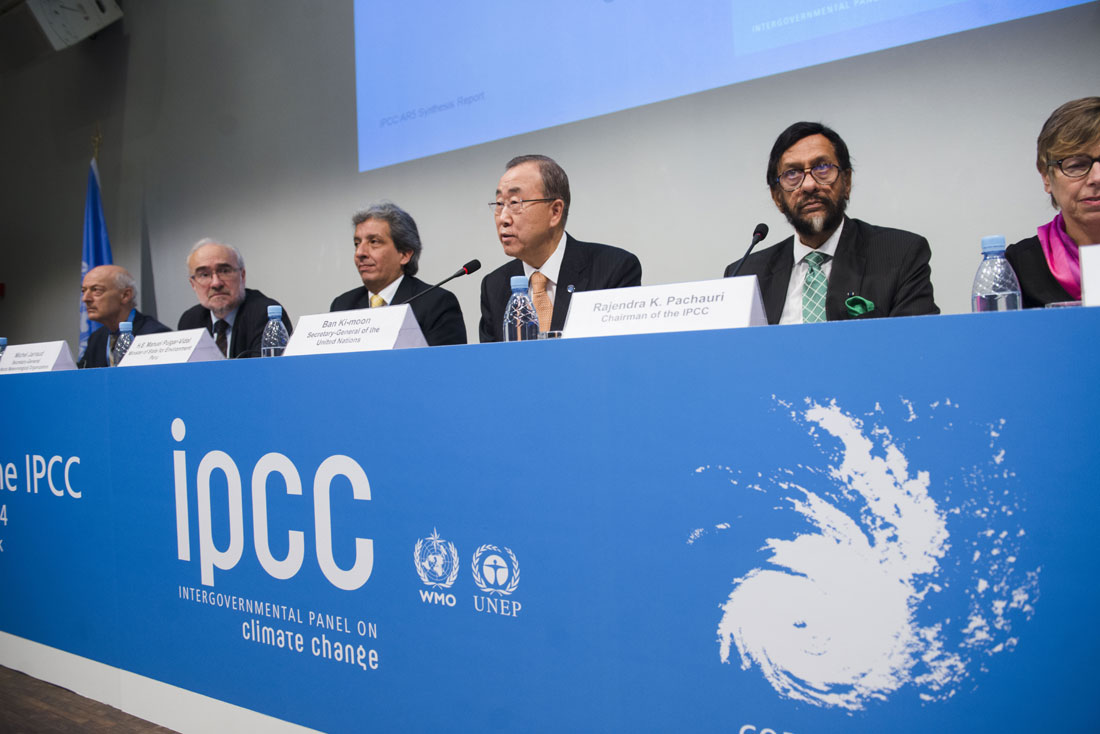It is a great honour and pleasure for me to speak a few words at this historic occasion of launching the synthesis report of the Fifth Assessment of the IPCC [Intergovernmental Panel on Climate Change].
We are doing this at a very historic and crucially important timing for humanity.
Sound science must be at the core of our efforts to meet the challenge of climate change.
For more than a quarter century, the IPCC has been at the forefront of increasing understanding about this issue, climate change.
Most recently, the IPCC provided the scientific foundation for the successful Climate Summit that I hosted in New York this September.
It brought together government leaders, business executives and finance officials and many civil society leaders. They all expressed strong commitment for a meaningful, universal climate agreement. Public and private financing sources showed the way forward for mobilizing funds. We made progress on carbon pricing, strengthening resilience and forming new coalitions to meet the climate challenge.
The Summit had enormous popular support. Hundreds of thousands of people marched in New York City and other major cities around the world to demand climate action. I was inspired to see so many global citizens taking to the streets and raising their voices loud and clear. While marching together with them, I hoped that world leaders should and could heed their voices.
The report we are launching today – the IPCC’s Fifth Assessment – was compiled by hundreds of scientists from around the world. It is the most comprehensive appraisal of climate change ever undertaken.
This Report offers three key messages:
One: Human influence on the climate system is clear – and clearly growing.
Second, we must act quickly and decisively if we want to avoid increasingly destructive outcomes.
Three: We have the means to limit climate change and build a better future.
The Report found that the world is largely very ill-prepared for the risks of a changing climate, especially the poor and most vulnerable who have contributed least to this problem.
The atmosphere and oceans have warmed. The amounts of snow and ice have diminished. Sea levels have risen.
I have seen for myself those rapidly melting glaciers most recently in Greenland together with the Prime Minister of Denmark, Her Excellency Helle Thorning-Schmidt.
As I am not a scientist, I am not able to speak in a scientific way. That is why during the last eight years as Secretary-General, I have been travelling all around the world, wherever and whenever I was able, to see the impacts for myself so that I could add to the voices of scientists in a political way, as a common man, without knowing [science].
Whatever I saw, I conveyed from the scenes: From Antarctica to the North Pole, the Amazon River basin, Lake Chad, Aral Sea. Please name any places which I have not been – that much I have been committed. I am adding my political voice to what scientists have been [doing], working very hard. I really appreciate them.
If we continue business as usual, our opportunity to keep temperature rise below the two degrees centigrade threshold will slip away within the next decade.
Even if emissions stopped tomorrow, we will be living with climate change for some time to come.
The good news is that if we act now, immediately and decisively, we have the means to build a better and more sustainable world.
Many tools and technologies are already available. Renewable energy sources are increasingly economically competitive. Energy efficiency has long proven its value.
Action on climate change can contribute to economic prosperity, better health, and more liveable cities, while reducing the risks of further environmental degradation. Economic growth and climate action can be mutually reinforcing.
There is a myth which is shared unscientifically and uneconomically that climate action will cost heavily but I am telling you that inaction of climate action will cost much, much more. Climate action and economic growth are two sides of just one coin.
With this new Synthesis Report, science has spoken yet again with much more clarity and greater certainty. Citizens are increasingly restive – but also eager to seize the opportunities of building a sustainable future.
Taking this opportunity, I would like to thank most sincerely all the scientists of the IPCC who have done outstanding work in showing the world the perils of climate inaction – and the potential of climate action.
You do not answer to any interests except our planet and the truth. You are trusted and most respected around the world. You have been at the centre of the global dialogue on climate since long before people started marching in the streets demanding action.
You – and the hundreds of scientists around the world who contribute to the IPCC – provide the hard evidence we need to make a change in our world, and human history.
This report gives a major push to the discussions at the Climate Conference in Lima in December – and to success in Paris next year. Without a global agreement, we will not mobilize action to the extent necessary to get the world on to a 2-degree pathway.
Science has spoken. There is no ambiguity in their message. Leaders must act. Time is not on our side.
Let’s work together to make this world, our only planet earth, sustainable economically, socially and environmentally for our succeeding generations. Let us preserve our only planet earth in a sustainable way.
Thank you for your leadership.

